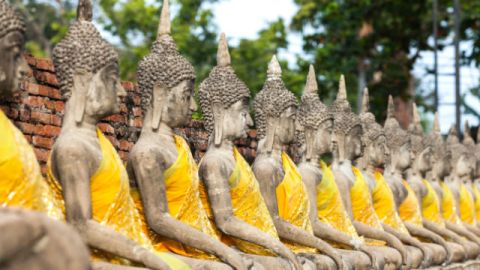Post 6: If Buddhism Is Plural, Is It Therefore Beyond Reproach?

As this series has progressed, far in a way the most frequent criticism I have received is of confusing the members of a religion with the religion itself. I think this criticism to be absurd. If these articles really represent an ad hominem, it is a justified one.
To explain: I once heard a phrase used to refer to committing the genetic fallacy/ad hominem/ arguments from authority (all species of the same phenomenon). The phrase was “tackling the man without the ball”. I bring this up because it highlights the silliness of the criticism against me. With tribalism and religion, there is no other target. Religiousness, be it belief or ritual or grouping, is a fiction, and a man-made fiction at that, which makes it a type of lie. Given the flexibility with definitions in “wisdom traditions”, the salient problem with fixed ideologies is that there is no ball to take down. (Or, at the very least, the man has cheated by affixing the ball to himself, and therefore deserves to be pulled down by it and exposed)
Religious traditions are human institutions. Without adherents, they would not exist. Therefore, a religion is identical to the set of all of its devotees. So, I am not asserting an identity without a connection; my critics are asserting a distinction without a difference.
Say my (meat, not straw; these are all things I have really heard, and more than once) interlocutors: If I weren’t so Western and unenlightened and closed-minded, I would know enough to have studied in depth that Buddhism is not one organized or unitary movement, but rather many traditions. I would know that the multifarious wisdom-tradition contains the differing sects of Theravada Buddhism and Mahayana Buddhisms, and of course Vajrayana Buddhism, and Zazen Buddhism and other Japanese Buddhisms, and so on. I would even know that many individuals accept and revere the teachings of Buddhist teachers and of Siddhartha himself without fitting into any named sect.
I would, of course, know that the aforementioned fact means that Buddhism is immune to criticism.
I’ll stop being sarcastic. Consider this argument from analogy: How does this description differ from Christianity, which does not earn the “varied traditions” defense nearly so frequently, if at all? The fact that Christianity is divided into Catholics and Protestants and from there into countless factions does not mean that I have no ground on which to challenge its wicked and superstitious moral and metaphysical claims. Particularly if I am discussing something like The Divinity of Jesus Christ, or The Resurrection, or the sublime goodness of The Beatitudes, my criticisms against those ideas happen to apply to nearly all Christians equally.
Similarly, I can level criticisms of Buddhism both in the particular, as I have done, and in the general, so long as they apply generally.
That is what makes it a perfectly good argument to say the following: It is a general (if not universal) feature of Buddhism that it promotes sympathy for the metaphysical stance that there is some “spiritual” or otherwise obscure feature of life and of the universe which we can understand only by speaking in the right contradiction, or by neglecting to elaborate on the right vagary, or by sitting in the right pose, or by humming the right nonsense. That’s what makes it so funny in Annie Hall when Jeff Goldblum worriedly yells into a phone: “I forgot my mantra!”.
So what weight does the appeal to plurality and vagary carry? None. Just because most people do not know the difference between major sects of Buddhism, or even that there are more than one, and just because nobody knows all of them, does not mean that we cannot argue against it.
Sure, we need caveats and conditions to discuss anything as big or as old a a major world religion. But, the idea that the concept of Buddhism is so varied and so ethereal that it is simply immune to criticism (in whole or in part) just does not stand up to even cursory scrutiny.
Image courtesy of Shutterstock.





